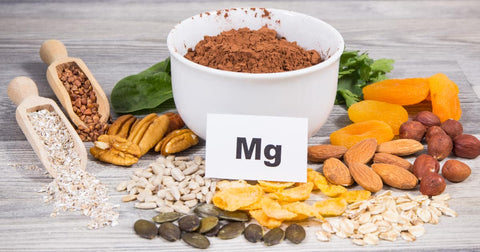Magnesium carbonate, a common form of magnesium supplement, is more than just a remedy for occasional indigestion. This vital mineral plays a crucial role in numerous bodily functions, supporting everything from bone health to mood regulation.

For women between the ages of 25 and 65, understanding the benefits of magnesium carbonate and incorporating magnesium-rich foods into your diet can unlock a wealth of advantages for your overall health and well-being. Let's delve into the power of this essential mineral and discover how it can nourish your body from the inside out.
Magnesium Carbonate Benefits: Beyond Antacids
While magnesium carbonate is often recognized for its antacid properties, offering relief from heartburn and indigestion, its benefits extend far beyond soothing an upset stomach. Here's a glimpse into its diverse range of advantages:
-
Supports Bone Health: Magnesium is crucial for calcium absorption and bone mineralization, helping to maintain strong and healthy bones. This is especially important for women, who are at a higher risk of osteoporosis as they age.
-
Promotes Muscle Relaxation: Magnesium plays a vital role in muscle contraction and relaxation. It can help alleviate muscle cramps, tension, and even headaches.
-
Enhances Mood and Reduces Anxiety: Magnesium is involved in neurotransmitter function, influencing mood and stress levels. Adequate magnesium intake has been linked to reduced anxiety and improved mood.
-
Supports Heart Health: Magnesium helps regulate blood pressure and maintain a healthy heart rhythm.
-
Aids in Sleep Regulation: Magnesium can promote relaxation and improve sleep quality by activating the parasympathetic nervous system.
Mg Foods: Nature's Magnesium Bounty

While magnesium supplements are readily available, incorporating magnesium-rich foods into your diet is a natural and delicious way to boost your intake. Here are some excellent sources:
- Leafy green vegetables: Spinach, kale, Swiss chard
- Nuts and Seeds: Almonds, cashews, pumpkin seeds, chia seeds
- Legumes: Black beans, lentils, chickpeas
- Whole grains: Brown rice, quinoa, oats
- Avocados: A creamy and delicious source of magnesium
Magnesium-Rich Foods: Unlocking Nutritional Powerhouses
- Magnesium in Peanut Butter: Enjoy a spoonful of peanut butter for a tasty magnesium boost. Two tablespoons provide about 12% of your daily recommended intake.
- Magnesium in Potatoes: Baked or boiled potatoes, with their skin on, are a surprising source of magnesium. A medium-sized potato offers approximately 10% of your daily needs.
Food Intolerance: A Potential Roadblock to Magnesium Absorption
In some cases, digestive issues like food intolerances can interfere with magnesium absorption, leading to deficiencies. If you suspect a food intolerance is affecting your gut health and nutrient absorption, a food sensitivity test can help you identify triggers and optimize your diet.
Magnesium Carbonate and Digestion: A Soothing Solution

Magnesium carbonate's antacid properties can help neutralize stomach acid and provide relief from heartburn, indigestion, and acid reflux. It can also act as a mild laxative, promoting bowel regularity.
However, if you experience persistent digestive issues, it's important to consult your doctor to rule out any underlying conditions and ensure you're taking the appropriate magnesium supplement for your needs.
Key Takeaways
- Magnesium carbonate offers a range of benefits beyond its antacid properties, supporting bone health, muscle function, mood, heart health, and sleep.
- Incorporating magnesium-rich foods like leafy greens, nuts, seeds, and legumes into your diet is essential.
- Consider a food sensitivity test to identify potential intolerances hindering magnesium absorption.
Disclaimer: This article is intended for informational purposes only and should not be considered a substitute for professional medical advice. Always consult your doctor before starting any new supplements or making significant dietary changes.
Frequently Asked Questions:
1. Can I take magnesium carbonate every day?
Generally, it's safe to take magnesium carbonate daily, but it's best to follow the recommended dosage on the product label or consult your doctor for personalized advice.
2. What are the signs of magnesium deficiency?
Symptoms of magnesium deficiency can include muscle cramps, fatigue, headaches, anxiety, and insomnia. If you suspect you might be deficient, talk to your doctor about getting your magnesium levels tested.
3. Can I get enough magnesium from food alone?
While it's ideal to obtain nutrients from whole foods, some individuals may need supplementation to meet their magnesium requirements. Factors like dietary restrictions, certain medications, or health conditions can impact magnesium absorption.
4. Are there any side effects associated with taking magnesium carbonate?
Magnesium carbonate can sometimes cause diarrhea, especially at higher doses. If you experience this, try reducing your dosage or switching to a different form of magnesium, such as magnesium glycinate or magnesium malate.
5. I'm experiencing digestive issues. Could a food intolerance be contributing to my magnesium deficiency?
Yes, food intolerances can disrupt nutrient absorption, including magnesium. If you're struggling with digestive problems, consider a food sensitivity test to identify potential triggers and optimize your diet for better nutrient absorption.


.png?v=1737390083)
.png?v=1737187409)


